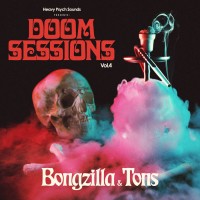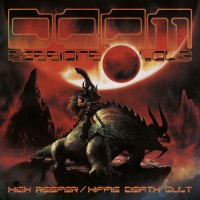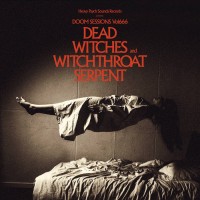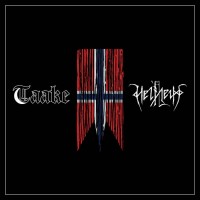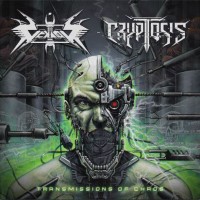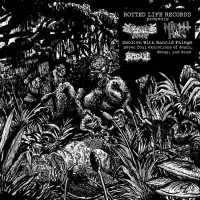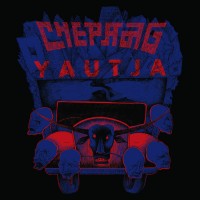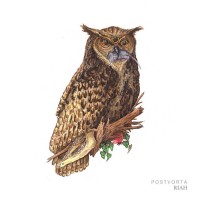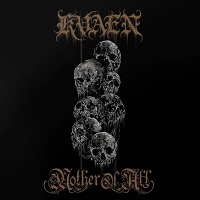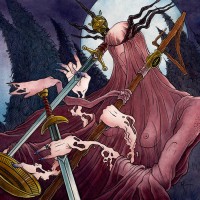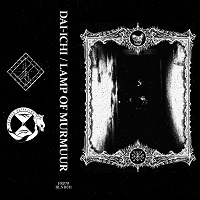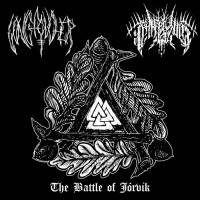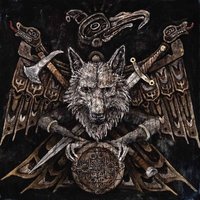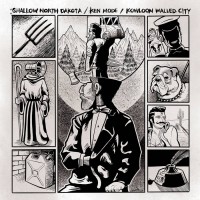Splitting Hairs / Hearing Splits (Jan-Jun 2021)

| Written by: | RaduP, musclassia, Troy Killjoy, nikarg, Abattoir, Bad English, Starvynth |
| Published: | July 19, 2021 |
We regularly review full lengths, collaborations, sometimes even live albums. EPs and demos often get love in our Clandestine Cuts series. Heck, we even review a bunch of stuff that isn't metal. But when was the last time you saw a review of a split album? Exactly! We are here to make up for that!
Covering the splits that were released in the first half of 2021. Take a listen to some artists putting out a record together without necessarily collaborating. The annoyance of having two or three Bandcamp streams, often with just one of the sides is worth the effort.
SH/HS 2020 Part 2
SH/HS 2020 Part 1
Vol. 3 of the recently commenced Doom Sessions split series from Heavy Psych Records sees the stoner doom of past EPs left to one side for now, with this split instead featuring grim sludge courtesy of 16 and Grime. 16 only released a new full-length last year in the form of Dream Squasher, but Grime's contributions here represent the first newly released music from the band in over 5 years. 16 kick off the split with three songs that ably display their brand of sludge; there's murkiness in the riffs and rumble in the guitar tone, but there's also keyboards to add a touch of grandeur, and the sound in general, whilst following the template for sludge fairly reliably, does incorporate some more traditional metal influences, such as during the chorus of opening track "Tear It Down", as well as veering off on quieter, more atmospheric-leaning detours. The material delivered by 16 is weighty, but also relatively accessible for sludge; Grime's contributions are rather less so. Fitting with the band's name, the music in the last two songs is noisy, vicious and grim, with a dirty guitar tone, vicious shrieks and powering drums working together to drag listeners into the mire. The slow, doomy trudges through these misanthropic soundscapes effectively manage to convert filth and repugnance as concepts into sonic form, whilst the occasional faster blasts punctuate this detritus with stabs of malice. As a combined listening experience, the more approachable style of 16 primes listeners nicely for the vulgarity of Grime, as well as offering a nice alternative to those few listeners that don't want their sludge to be as unpleasant as possible.
Bandcamp: Label (full)
by musclassia
In Vol. 4 of Heavy Psych Sounds Records' Doom Sessions split series, Bongzilla follow up Weedsconsin, their first album in 16 years, with three additional songs of slow, fuzzy doom that draw from both the bluesy groove of stoner metal and the harshness of sludge. "Mother Flower's Little Helper" has a guitar tone build perfectly for dirty stoner metal, but also finds time to descend into some grim sludgy trudging, with phlegm-imbued vocal gurgles and glacial pacing in a section midway through. The band lean closer to stoner metal on this split, and perhaps the most enjoyable of their three songs is "Cupcake", alternating between quiet psychedelic blues jams and riff onslaughts. Bongzilla are joined by Tons, the latest Italian band to feature on one of the Doom Sessions records. Their three-parter "Chronic Morning Obesity" is perhaps more oriented towards sludge, with more prominent (harsh) vocals, sludgy grooves and a grimmer guitar tone; nevertheless, part 2 of their contribution does feature some pleasant stoner rock-inspired guitar noodling. The lead guitar work is a highlight of "Chronic Morning Obesity", working nicely in combination with a slick backing groove and some psychedelic electronic work to give part 3 a fairly triumphant feel.
Bandcamp: Label (full)
by musclassia
May 2021 saw the fast release of yet another Doom Sessions split from Heavy Psych Sounds, with this edition featuring High Reeper from Philadelphia and Portland's Hippie Death Cult. These splits have already spanned a sizeable amount of the sludge/stoner/doom spectrum, and this latest version further extends that, with High Reeper playing an epic heavy-influenced stoner metal style reminiscent of early The Sword. The triumphant chugging march and guitar leads are combined with an unusually up-front vocal style on "Vermillion Iron"; the high-pitched tone of the frontman isn't quite to my tastes, and the heavy/classic doom aspect of High Reefer isn't something I hugely enjoy, but there's moments in each of their songs where they slip into more up-tempo and slick stoner grooves, and there I find myself enjoying the band's work more. Hippie Death Cult start off on a very different note, with spoken samples and an ominous tom-heavy percussive march setting the scene nicely for an up-tempo, almost thrashy riff. There's a lot going on in "Fill The Fires", between quiet atmospheric builds with hazy, effects-laden vocals, proggy meandering, hints classic doom and up-tempo rampages. I certainly find Hippie Death Cult's music more interesting than High Reeper, but I do think they could benefit from a bit more focus, as there's times that I found myself a bit lost in their songs, but when they're on form, such as during the simply lovely guitar solo in "Towards Infinity", they sound pretty great.
Bandcamp: Label (full)
by musclassia
Going all in on the Satanism stereotypes, the June edition of Doom Sessions, which by now appears to be turning into a monthly series, is titled Vol. 666 and features occult-inspired British doomsters Dead Witches alongside French band Witchthroat Serpent, maximising the split's witch quota. Dead Witches, it is safe to say, are inspired by their countrymen Electric Wizard; from the lengthy song (14 minutes for their contribution, "D.I.E. (Dragged Into Emptiness") to the Dopethrone-esque musical style, Electric Wizard's similarly witch/horror-inspired shadow lingers over Dead Witches. Still, there's much worse bands to be derivative of, and D.I.E. has a nice tone, good pacing and some fun ebbs and flows between the fuzzy doom grooves and quieter atmospheric periods. Witchthroat Serpent kick off their first song, "The Fall Of Whitewood", with a fetching little guitar lead before revealing themselves to be very much akin to Dead Witches. However, "The Fall Of Whitewood" is less Dopethrone and more later-era Electric Wizard, with a slightly droning nature to the riffs on top. Although neither reinvents the wheel, both are reasonable renditions of an oft-repeated style; of the two, I would say that Dead Witches bring a bit more to the table in terms of range and impact.
Bandcamp: Label (full)
by musclassia
Hoest and V'gandr are no strangers to each other, having done an admirable job over the years representing the Norwegian black metal scene not only with their unique takes on the genre but also with their respective collaborative efforts. Taake, more specifically, has ventured almost exclusively into split territory recently, focusing on shorter bursts of creativity alongside lesser known countrymates to satisfy artistic urges as opposed to fulfilling the obligations of a proper full-length album. Henholdsvis feels the most natural in terms of flow and melody of these offerings, pairing harmoniously with the Viking style of Helheim in a way that establishes a comfortable and familiar setting, supported by a relatively welcoming atmosphere considering the colder nature both bands are inclined towards. If you're someone who's never listened to either of these projects, this split serves as a succinct and healthy sample of what you can expect from the rest of their back catalogs, and for anyone intimately knowledgeable on either of these subjects, you can enjoy a small dose of additional content that's pretty much in line with everything else they've released in the past decade.
Bandcamp: Taake (full) / Helheim (full)
by Troy Killjoy
After a four-year hiatus following the critically acclaimed Terminal Redux album, Vektor's mastermind David DiSanto and guitarist Erik Nelson decided to reform the band with new members on drums and bass. "Activate" is a short dynamite song referring to the reactivation of Vektor, while "Dead By Dawn" follows the path of "Collapse" from the band's last album, starting as a ballad with clean vocals and progressing to something more aggressive. The other band on this split EP is Cryptosis, and you may know them already because they used to release music under the Distillator moniker. They decided to change their name because they now play a different kind of thrash that is more technical and progressive, and more influenced both stylistically and musically by - take a guess - Vektor. Similarly, "Decypher" is the direct track on offer here by Cryptosis and "Prospect Of Immortality" is the expansive one. Both tracks are also featured in their debut full-length, Bionic Swarm, which was released in March. The two bands plan to tour together and they sound like a pretty good fit judging from this EP.
by nikarg
The Lucifer / Kadavar split is a distinct kind of split where each of the bands involved cover a song, in this case two retro hard rock bands covering some influential 70s hard rock / proto-metal songs. First we've got Lucifer covering "Pull Away/So Many Times" from Dust, a band that is surprisingly overlooked considering how metal their cover arts were and how Marky Ramone drummed in the band before he was a Ramone. The cover leaves most of the song pretty intact in its epic feeling, only switching up the gender of the main singer and modernizing the production, and the performances, especially during the solos in the final part of the song are fantastic. Kadavar cover Fleetwood Mac's "The Green Manalishi (With the Two Prong Crown)", a song better known for being covered by Judas Priest, from a band better known by their later material. As surprising as that sounds, Kadavar's version is actually softer than the original, mostly due to the vocals. Overall, it's a short collection of tracks that mostly do justice to the originals, and they're a pretty good reminder that that era of metal's history is still pretty overlooked.
YouTube: Lucifer side / Kadavar side
by RaduP
Swollen With Rancid Phlegm is as foul and disturbing as its title suggests. It was promoted as featuring seven putrid excretions of death, decay, and doom, and this split is exactly that. Both bands are 3-pieces that mix death and doom metal, but with quite different approaches at that. On one hand, Cryptic Brood have a very sludgy sound that is accentuated by a sick bass tone. They also have double vocals (screaming and growling) and their songwriting is very unpredictable with slow, crawling doom sections that are followed by d-beat, punky, fast sections, and vice-versa. Night Hag, on the other hand, have more straightforward songs with chunky bits of old-school death metal, since you can hear a lot of Incantation and Death on their first and second track respectively. Their sound is also ridiculously good and heavy, again with a demolishing bass tone. My favourite song on the split is the last one; "Rotting" is the epitome of death doom metal and feels much shorter than 11 minutes.
Bandcamp: Cryptic Brood side / Night Hag side / Label 1 (full) / Label 2 (full)
by nikarg
Here we have a union of some of the most caustic hardcore bands in the biz today, the sludgy Yautja and the Nepalese grind outfit Chepang, each of them already familiar with the main page as far as their latest albums go. Both bands do stray pretty far from what is usually considered hardcore, but it seems that this split has gotten both of them to kinda emphasize that part of their sound, even if each of them approach if from a pretty different direction. Yautja even come with one of their shortest songs, with "Test Subject" being shorter than anything on Chepang's side. The bass-heavy sludge still exemplifies Yautja's penchant for some chaos, but a lot of it is more channeled on pummeling blasts. Chepang's chaos is obviously a lot more intense, and at times it feels like the drums and the guitars and the bass are all tumbling down the stairs and you're tumbling with them and you've broken every little bone in your body. There are more pace changes and also the pace changes go even further. Pretty crazy for such a short runtime.
Bandcamp: Yautja side / Chepang side | Label (full)
by RaduP
A collaboration between two death metal bands hailing from the Northern part of Germany, Carnal Tomb and Gravehammer, offers two new straightforward "filthy" tunes. Although relatively young, both acts have put out quite some material so far (especially Carnal Tomb). Lengthwise this split may not bring much to the table, since it clocks only 10 minutes and was put together spontaneously. However it does sums up some of the stuff they've been producing so far in their music career. The first one, "Osseous Sacrophagus", is a typical Carnal Tomb track that strikes with a raw, mid-paced old school death metal vibes. This pounding, riff-engaged music piece also possesses cleaner production comparing to their fellow countrymen. On the other hand, "Yellow Cross Of Shame" by Gravehammer operates with a faster tempo, brings out less strength in vocals, and deliver more obscure approach in general. Although Carnal Tomb might be a bit more established on the scene with another full length record coming soon, Gravehammer are for sure capable of putting together even more proper music product (possibly debut long player in near future) to show their full strength.
Bandcamp: Carnal Tomb side / Gravehammer side / Label (full)
by Abattoir
Postvorta released two new albums in 2020: the huge (>80-minute) sludgy post-metal Porrima and the more bitesize electronica of Siderael Pt. One. As Trepanation Recordings describes itself as a label for 'extreme, experimental and progressive metal and dark sounds', it's probably not surprising to hear that Riahpstvrt, their collaboration with fellow Italian post-metal band Riah, leans closer to the sound of Porrima than Siderael Pt. One. Riahpstvrt is comprised of the collaborative title track, plus one song each from the two bands. Postvorta's solo effort "Hollow" is a heavy brute, starting off sounding like Cult Of Luna in their more brooding moments before growing in complexity and intensity. Riah take a much lighter approach on "Epidermide", showing off an instrumental sound that straddles the post-rock/post-metal border with delicate clean work alongside some relatively heavier riffs. When the two bands collide on the three-part "Riahpstvrt", things start off more in Riah's territory, shifting from ambient serenity to delicate, sedate post-rock. Even when Postvorta's heavier vocals enter the fray, the instrumentation is still closer to the tone of "Epidermide"; it's not until the halfway mark that the intensity of Postvorta begins to impose itself, but this latter half belongs to that band, with slow, brooding riffs and harsh gutturals dominating the soundscape. Even then, however, Riah utilize their post-rock sensibilities, adding nice touches alongside the heaviness. I think it's during these minutes, when Riah's lighter tone is acting as a contrast to the bleakness and heaviness of Postvorta, that this song and split really shines. I don't think I'll return to Riahpstvrt, but I would definitely be interested in a more long-form expansion of the vibes in the closing minutes of the title track.
Bandcamp: Postvorta side / Riah (full) / Label 1 (full) / Label 2 (full) / Label 3 (full)
by musclassia
Psychonaut made quite the impact last year with their debut record Unfold The God Man, an album that would have likely done well in the Best Post-Metal Album and Best Debut Album categories in the 2020 Metal Storm Awards if it weren't for the minor technicality that the album had already been released in 2018. This news likely came as a surprise to many people, as Unfold The God Man has been advertised as a March 2020 release; however, this was only the date of the album's release on Pelagic Records, who seem to have tried to wipe all trace of the record's initial self-release (a logical step, if something of a nightmare for those tasked with maintaining databases such as ours). Not long after this, we have the first fully new music from Psychonaut under the Pelagic Records umbrella, Emerald, a split with fellow post-metal power trio Sâver.
Neither band has held back with their contributions on Emerald; Psychonaut's 16-minute epic "The Great Realisation" outruns anything featured on Unfold The God Man, but is exceeded by Sâver's own effort, the two-parter "Dimensions Lost" and "Obscured By Aeons". Do the songs justify the length? Absolutely. Psychonaut build upon the incredible base they set with Unfold The God Man; "The Great Realisation" is an excellent summary of the different facets of their progressive post-metal sound, from the lengthy gradual clean builds and the stirring vocal harmonies to huge roars, powerful riffs and evocative climaxes. It's a really enjoyable journey, and one that reminds me why I was so enamoured with Unfold The God Man around this time last year. I knew Psychonaut before Emerald; in contrast, this split is my introduction to Sâver, and it's a fairly impressive one. "Dimensions Lost" makes for a big change of pace from "The Great Realisation", as this track is purely ambient electronica; it works better whilst listening to the split as a whole rather than each band's contributions separately, as it runs for quite a while, but within the context of the split, it's a nice change of pace before "Obscured By Aeons", which introduces the heavier side of Sâver to new listeners. Sâver's brand of post-metal shown on Emerald is a more brutish form than that of Psychonaut's, with a relentless march of hefty, mid-tempo crunch. The diversity mainly comes from switching between softly sung and screamed vocals, as the riffing approach remains similar throughout. Sâver do lack some of the range of Psychonaut, who shine brighter on Emerald, but if you prioritize sludginess in your post-metal, Sâver may well be up your street.
Bandcamp: Psychonaut side / Sâver side
YouTube: Label (full)
by musclassia
This split features a track each from two one-man projects, the latter hoping its debut full-length released this year will replicate the success of the former's. Kvaen's The Funeral Pyre made major ripples in the underground with its exciting meloblack sound, and comments on social media suggest that a sophomore is currently in the pipeline. "Northbothnia" serves as a stop-gap until then, following unsurprisingly in the vein of The Funeral Pyre with a big sound, powerful meloblack riffing and ear-catching drumming, particularly in its use of the toms. The clean break in the middle is a particularly nice touch, the jangling cleaner guitar tone positively contributing to the atmosphere before an exciting guitar lead takes over. "Northbothnia" is confirmation of the talent displayed on last year's meloblack breakout hit; Mother Of All, the other contributor to this split, trades meloblack for a more melodeath-oriented sound, but must have been hoping that debut record Age Of The Solipsist received a similarly enthusiastic response (although sadly this wasn't the case here). "Autumn", the song featured on the split and the opening track on the then-upcoming album, isn't completely detached from Kvaen's sound, with some powerful tremolo riffing and blasting going on; however, the more metalcore-leaning vocal style, extensive use of acoustic guitars, and lower-register guitar base all plant the song in melodeath territory. It's quite an exciting track, finding a solid middle ground between extreme metal intensity and Gothenburg/metalcore accessibility that should find a healthy audience. This split isn't actually available to find in a complete package on streaming platforms, as far as I can see; it was released as a limited edition physical release that is long sold out, but the songs can be found individually on YouTube.
YouTube: Kvaen side / Mother Of All side
by musclassia
You may have noticed that is there is one genre that seems most prevalent in this edition, it's doom. Part of it is due to how big of an umbrella term "doom metal" is, so I could even slip some post and sludge stuff in. Part of it is the "Doom Sessions" series. Part of it seems the willingness of doom bands to collaborate. So here we have the classic case of the established band doing a split with the up-and-coming band. Ungraven didn't really come out of nowhere, even if they're still not at the full-length phase yet, but they started out as the project of Conan's Jon Davis, so you can pretty much expect their side of the split to sound pretty much like Conan, as in gigantic and heavy. Jon was recently joined by two other musicians, so now it's pretty much a settled thing that Ungraven is a band. There aren't really any surprises in Slomatics's sound, only the realization of how well the sounds of the two bands complement each other. Both make monolithic fuzz music, but Ungraven's is a bit more immediate and crushing, while Slomatics is more hypnotic.
Bandcamp: Ungraven side / Slomatics (full)
by RaduP
I'm in a bit of trouble here, because the label's Bandcamp page already did such a fantastic job at describing the appeal and the essence of this release that I have a hard time competing with and not taking cues from it. But the jist of it is: Dai-Ichi and Lamp Of Murmuur are both raw black metal bands that showcase two opposite ends of the spectrum. On one hand we have the enigmatic Dai-Ichi, whom I have discovered thanks to this split, and who take on a more primal and violent version of raw black. And then there's Lamp Of Murmuur, of whom we've already talked at length, and who has let us peak beneath the kvlt curtain with a few interviews. The use of "romantic" and "improvisational" means that there is a primal and violent part to it too, but it's focus is towards a distinct kind of musicianship and emotion. Romantic raw black metal seems to be getting some traction, and it's not hard to see why, considering how much of it stems from the same place of pure unadulterated passion.
Bandcamp: Lamp Of Murmuur side / Label 1 (full) | Label 2 (full)
by RaduP
Lungtoucher popped up on my radar as part of last year's Clandestine Cuts series, when Foolish Necromancy won the audience vote in the May edition. I was curious to see what the British one-man black metal project would get up to next; whilst The Battle Of Jórvík is not what Lungtoucher got up to next (it's actually release number five since Foolish Necromancy), it was the first new release that I was aware of, so I made sure to check out this new collaboration with fellow one-man black metal project Panzerwar (the intro and outro pieces are credited to dungeon synth project Maiden Hair Ov England, which already collaborated with Lungtoucher on 2020's Blōtmōnaþ split). Introductions out of the way, The Battle Of Jórvík is inspired by the titular conflict between the Great Heathen Army and Northumbria, although once the dungeon synth intro is out of the way, you'd be hard pressed to tell: good luck deciphering lyrics in Panzerwar's second wave-derivative black metal sound. Panzerwar's side of the split could easily have been recorded in 90s Norway, between the lo-fi production, reverb on the vocals and riffing style. For those with a taste for that sound, I imagine it's a perfectly reasonable interpretation of it, but as it's a sound I have minimal inclination to listen to, the more satisfying part of the split belongs to Lungtoucher who, whilst still playing a very conventional form of black metal, has a fuller production, greater inclination towards melodic elements, good use of synths and some imposing, powerful riffs, all of which appeal a lot more to me. It wasn't until "The Heathens Approach" began that I remembered why I had actually found Foolish Necromancy intriguing in the first place, with the atmospheric, gradually de-intensifying outro drawing me in after feelings of indifference towards Panzerwar's contributions. I also enjoy the melancholic atmos-black of "York Is Lost" and slow burn of "A Somnium Regum"; The Battle Of Jórvík hasn't sold me on all acts involved, but it's convinced me to continue to pay attention to Lungtoucher's future efforts.
Bandcamp: Lungtoucher (full) / Label 1 (full) / Label 2 (full)
by musclassia

Thy Darkened Shade / Amestigon / Inconcessus Lux Lucis / Shaarimoth
SamaeLilith: A Conjunction Of The Fireborn
Thy Darkened Shade, Amestigon, Inconcessus Lux Lucis and Shaarimoth join forces in a monster split featuring over an hour and a half of music spread across 15 songs, released by World Terror Committee.
The Greeks Thy Darkened Shade have not given us a full-length since 2014's Liber Lvcifer I: Khem Sedjet so their contribution here is such a treat. Their brand of inventive black metal with its esoteric atmosphere, accentuated by choirs and clean vocals, and the (super audible) bass and guitars being in constant dialogue with each other, make the anticipation for Liber Lvcifer II a thousand times stronger. Just listen to "Undead Lineage" and have your mind blown. Amestigon from Austria adorn their black metal with Middle Eastern melody, as well as progressive doom and industrial elements. The 13-minute "The Tortuous Serpent" stands out and features one of the best outros you are going to listen to this year. UK's Inconcessus Lux Lucis is definitely the most 'upbeat' of the bunch, with their black / death / thrash immediacy and their menacing character showing off in the two main songs, while there is also a symphonic intro track, an acoustic instrumental in the middle, and a ritualistic epilogue. Norwegians Shaarimoth conclude this excellent split with some malicious and apocalyptic blackened death metal that combines pummelling aggression with immersive atmospheric passages and dark melodies.
Even though there are stylistic differences between the four bands, SamaeLilith: A Conjunction Of The Fireborn remains coherent and engaging throughout, offering variety in its ritualistic and occult extreme metal. To be experienced in absolute darkness with maybe only a black candle burning in the distance.
Bandcamp: Label (full)
by nikarg
Though this is far from being the only one-man band black metal split in this edition, I wouldn't call the black metal here on display neither "raw" nor "pagan" despite it clearly having to do with both those descriptors. Kommodus' music mostly deals with either the Roman empire or Yukio Mishima fangirling, and I don't think I have to tell you what's the pagan theme of Pan-Amerikan Native Front. Kommodus signs his three songs as "hymns of overcoming self-sabotage and fighting with everything you have. An immortal struggle we all must face", which is pretty hard to get from just listening to the music because those inhuman howls are completely indecipherable. Pan-Amerikan Native Front dedicates their side of the split to Tom Hill, which makes sense, I guess. The two bands have a lot in common, especially in their command of the riff and creating a dense atmosphere with it. But Kommodus' side is surprisingly melodic, and it's not like Pan-Amerikan Native Front isn't melodic, but I found it a lot more ingrained in their sound as opposed to being so upfront. But regardless, both sides have riffs and blasts and howls for days.
Bandcamp: Kommodus side / Pan-Amerikan Native Front side
by RaduP
I have never heard of The Mountain King before, but Black Autumn is a band that I know and listen to. They mix ambient-oriented black metal with a doom touch but this, to me, is the softest thing what Michael Krall has ever composed. The band tries to go abstract, melancholic, but the music is still too heavy to call it neofolk. With this softer approach Black Autumn blend in this split album with the other German one-man band, The Mountain King. This one sounds like drone metal mixed with sludge, and it's also seasoned with avant-garde, minimalistic, and ambient-oriented sound. If you expect to hear pure or tr00 metal, forget it, it is not here. It's a bit of a challenge to listen to it in full but feel free to give it a try.
Bandcamp: Black Autumn (full) / The Mountain King (full) / Label (full)
by Bad English
There are few projects more prolific than drone-based duo Nadja, but "From The Lips Of A Ghost In The Shadow Of A Unicorn's Dream" is surprisingly their first newly released song since 2018's Sonnborner/Artificial Act Of God albums. That song title is quite a mouthful, but unsurprisingly the song lasts longer than it takes to say it, falling just shy of the 20-minute mark. The base of the track is noisy droning guitar feedback, which is sustained by slow, measured percussion. Eerie choirs can be heard faintly in the mix, adding a hint of the dramatic and sinister to the dense wall of droning distortion, a wall that is built higher and higher during the track until it overwhelms listeners. This exhausting exercise in feedback and creepiness is followed by a slightly more vulgar strain of drone; Disrotted's "Pastures For The Benighted" is similarly glacial and feedback-heavy, but the tone is sludgier and grimmer, and those background choirs are replaced with deep, semi-growled/semi-spoken vocals taking up a more central role. As the song progresses, the relentless drones give way to more finite chugs, the track morphing into a crushing sludge doom of a thoroughly unrefined and plodding nature. The split is a long and rather draining listen, but it features two bands that are both very capable of making dark drone music somewhat engaging, so kudos to them.
Bandcamp: Label (full)
by musclassia
Olmo "Déhà" Lipani is a real phenomenon. The list of his current and former bands seems never-ending (Déhà, Slow, Acathexis, Yhdarl, Clouds, Merda Mundi, Wolvennest, ...) and in the course of the last 15 years, the workaholic and multi-instrumentalist has been involved in more than 70 projects, not counting his activity as a producer and operator of a recording studio (Opus Magnum Studios), a graphic agency (I Breathe Needles) and a small record label (Musical Excrements). Nevertheless, there's still enough time for various collaborations, such as this liaison with his compatriot Iwein Denayer of Humanity Defiled. So Humanity Burns goes a bit beyond the scope of a conventional split EP, as Déhà has taken over the vocals on all Humanity Defiled compositions, while Arnaud Strobl of Carnival In Coal and We All Die (Laughing) is featured on the first of the four Déhà tracks. In any case, death metal is the common denominator in the almost 35 minutes of this shared effort's running time. Déhà has taken a fairly traditional approach to this, with his four tracks sounding like 90s OSDM, with very straightforward song structures and aggressive, thrashy riffing. Humanity Defiled's three-song contribution, on the other hand, turns out to appear a bit more modern, with influences from hardcore/deathcore in the songwriting and a number of well-placed samples providing variety and atmosphere. Thus, it comes as no surprise that the highlight of the EP was penned by Mr. Denayer: the ten-minute and pretty doomy "Ringed By Dark - Engulfed In Light" forms the worthy conclusion of this very entertaining demonstration of death metal made in Belgium.
Bandcamp: Label (full) / Déhà side / Humanity Defiled side
by Starvynth
Are you ready to get your IQ lowered by some beatdown hardcore riffs? You're in luck! There's barely over 10 minutes of material on this split, with each band contributing with two songs, but that's a couple of minutes longer than Sunami's longest release, and a couple of minutes shorter than Gulch's longest too. Gulch are the only of the two to actually get to the full-length stage (that we talked about here), and its their side I am fondest too. Sunami are pretty good beatdown and I love how punchy the bass is, but it's a bit too "tough guy" hardcore that I don't find that appealing. Gulch are more on the metal side, or at least they're rooted in hardcore that is a bit heavier. Other than a pretty ill-fitting acoustic outro on a song, this is pretty much perfect knuckle-breaking mosh music, whether it's the more classic beatdown or the more metalcore-ish part of the sound.
Bandcamp: Label (full) / Sunami side / Gulch side
by RaduP
To the surprise of nobody, brutal death slamcore bands sound like brutal death slamcore bands. This split, featuring the international amalgam of South Africa's Vulvodynia -- aptly named after the medical condition wherein the sufferer experiences pain around their vulvar region -- and the UK's Acrania -- an even lesser known, quietly existing duo -- doesn't push any boundaries, doesn't seek to influence or inspire, doesn't even make a mark on the scene as a whole. But it does showcase exactly what both bands have to offer in an easily digestible ~15 minute serving, slamming and noodling with hints of technical proficiency along the way. This is more so the type of release only diehard fans, collectors, underground supporters, close friends, family members, and/or casual-yet-curious readers of a bi-annual article series dedicated to the various split releases throughout the year would enjoy, or at least bother to listen to. It's a stop-and-go headbang-inducing chug-a-thon with plenty of subtle buildups and playful notes, with Vulvodynia's more impressive production value and soloing giving them a slight edge over their "competition".
Bandcamp: Vulvodynia (full)
by Troy Killjoy
Autolith's Caustic Light was, for me, one of the most exciting releases featured from an up-and-coming band in last year's Clandestine Cuts series (an opinion supported by it winning the Staff Pick for Clandestine Cut Of The Year). There isn't a full-length follow-up in the immediate future, but this split with Knoll offers a first glimpse at their musical development since Caustic Light. In contrast to their fellow Memphis natives, grind/math outfit Knoll have released their debut album, with Interstice making a vicious first impression. Although Knoll feature twice as many songs on this split than Autolith, their contributions take up nearly half the runtime, with "Gored Veil" shooting by in a blitz of hyperspeed blast beats, frenetic grind riffs and vicious vocals, with an occasional section that is merely 'fast' (I particularly enjoyed the brief let-up in intensity for a twisted groovy riff near the end of this song). There's a peculiar quasi-ambient (with a little bonus trumpet) intro to "Lapse Of Apothegm", but otherwise it's much the same story. Autolith exhibited several styles on Caustic Light, but none of them were grindcore; the combination of sludge, crust, hardcore and (on the final song) post-metal was similarly vicious, but less relentless. Perhaps to maximize the contrast with their split companions, Autolith's "Glass Hive" pretty much completely refrains from up-tempo assaults and instead delves further into the sludge/post-metal heard on last year's EP's "Unyielding Loss"; a meaty, pounding sludge opening (elevated by the beautifully rumbling bass tone) kicks off a grim yet introspective journey with a surprising amount of semi-melody in the guitars, not to mention the use of keyboards. A dynamic, impactful and gripping track, "Glass Hive" suggests that Autolith may be turning into a full-on post-metal band, albeit on the sludgier, crustier end of the spectrum (perhaps something close to Conjurer, and if that turns out to be the case, based on how great "Glass Hive" is, I am now even more excited to hear what their debut full-length will feature.
Bandcamp: Knoll (full) / Autolith (full)
by musclassia
Colorful artwork, a title mentioning the Strange, band names featuring "Lord" and "Wizard": you know before pressing play that you're getting some stoner or sludge metal. On Four Tales Of The Strange, Dust Lord and Bog Wizard deliver four tracks nestled in the Venn diagram overlap between stoner and sludge; the guitar sound of both bands is thick and dense, the riffs are groovy and the guitar work Southern-tinged, but there's also plenty of stoner rock influence in some of the guitar leads and driving riffs. Both sides are displayed on Dust Lord's first track "Not Men, Not Women, Not Beasts", a visceral opening to the split, with fluctuation between the two. "Career Opportunities" is more firmly in the sludge camp, spending its first half crawling through thick, murky walls of distortion, before picking up the pace slightly in its closing minutes. Bog Wizard might lure listeners into a false sense of security to begin with on "Paladin Of Death", with the running water sound effects and clean guitar, but when the distortion arrives, it's even more suffocatingly nasty and plodding than Dust Lord ever manage to be. The style doesn't differ much between the two, although Bog Wizard's vocal style is of the clean-sung hazy variety that is so popular in stoner metal, in contrast to Dust Lord's harsh roars. The regular fluctuations between slow, trudging sludge doom and more up-tempo and slick driving rock/metal aren't always convincing, but they do avoid Four Tales Of The Strange becoming too exhausting a listen.
Bandcamp: Dust Lord (full) / Bog Wizard (full)
by musclassia
"Shallow North Dakota is the heaviest noise rock band you've never heard." states this release. They're right about the "never heard" part. I have my doubts about the "heaviest" part, but then again I have no idea how heavy the noise rock bands I haven't heard are. What matters is that this is a pretty important split because it acts as both a crowdfunder for Shallow North Dakota's drummer/vocalist Tony Jacome, who was recently diagnosed with stage four pancreatic cancer, and also as a leeway for more people to get into a very overlooked band, including yours truly. The split consists of three Shallow North Dakota songs, the first one being an unreleased one from 2003, with the other two being covers by KEN Mode and Kowloon Walled City. And if what I heard here convinced me of anything, it's not that Shallow North Dakota are the heaviest, but that they're fantastically fuzzy and noisy, and criminally overlooked. Hell, noise rock and sludge don't really seem to be that far off anyway.
Bandcamp: Kowloon Walled City (full)
by RaduP
Anything we miss? What were some of your favorite splits of the year so far?
Comments
Comments: 8
Visited by: 56 users
| nikarg Staff |
| Bad English Tage Westerlund |
| Troy Killjoy perfunctionist Staff |
| VileVick-Bryant |
| no one |
| UnknownCheese Posts: 205 |
| RaduP CertifiedHipster Staff |
| UnknownCheese Posts: 205 |
Hits total: 3327 | This month: 25




